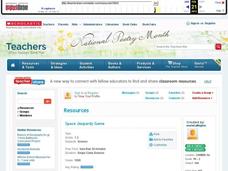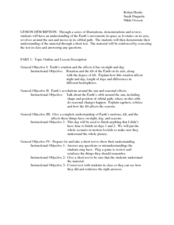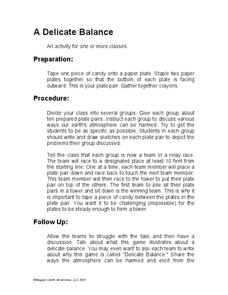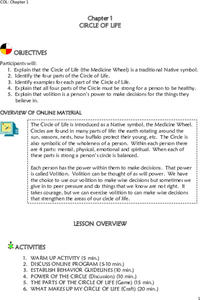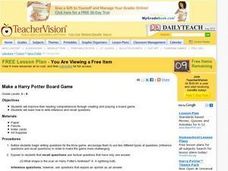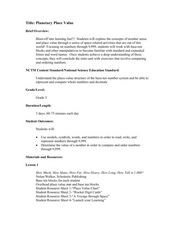Curated OER
"101 Amazing Earth Facts" Game
Students read for comprehension, work cooperatively to learn "101 Amazing Earth Facts," and compete as teams in a Jeopardy-like game.
Curated OER
Earth Day
Learners access a variety of Earth Day themed websites. They locate ideas to celebrate the holiday and examine how to protect the environment and conserve energy.
Space Awareness
Sun, Earth and Moon Model
The moon orbits Earth while the Earth is rotating, and the Earth revolves around the sun. This can be a tricky concept for young astronomers. Implement an activity that helps distinguish between the movements of Earth's systems around...
Curated OER
Space Jeopardy Game
Students explore space. In this space activity, students analyze the sky and what causes its changes. Students describe the moon patterns and use a model to show changes in its shape. Students also describe the first trip to the moon....
Teacher Vision
Political Events and Summer Olympic Games
During an Olympics year, the world joins together to celebrate athleticism, patriotism, and history. Learn about the Olympiads of the 20th century with a research project in which groups research one year's Olympic Games. They note the...
Curated OER
The Changing Earth
Students observe and analyze weathering. In this earth science activity, students demonstrate physical and chemical weathering in two experiments, then write questions for a class Jeopardy game.
ARKive
An Introduction to Endangered Species
Explore the world's endangered species with a presentation and bingo game activity. After viewing a presentation about the meaning of endangered species as it relates to specific animals, kids play a game of bingo with cards that...
Curated OER
Earth's Movement in Space
Students explain how the Earth's tilt and rotation causes night and day. For this earth science lesson, students determine how seasonal changes are caused by Earth's revolution. They play a jeopardy team game at the end of the unit to...
Captain Planet Foundation
Energy Flow in the Garden
How can you tell what an owl has eaten? Study the food chain and flow of energy in an ecosystem by dissecting an owl pellet and noting the bones found inside. Additionally, the lesson includes a game about consumers and producers with a...
Curated OER
Hubris Lesson Plan
Bring this instructional activity on hubris to your short story unit. After reading Jack London's "To Build a Fire," young readers discuss the role of hubris in the protagonist's death. The instructional activity has connections to other...
Colorado State University
What Is a "Model"?
Model the transfer of energy during a typical 24-hour period. Young scholars use a game-like approach to learning the patterns of heat transfer through the day and night. Groups of four exchange different tokens as the energy...
Curated OER
A Delicate Balance
Learners complete an activity to help them understand the Earth's delicate balance. In this Earth lesson, students will draw and discuss the ways the Earth's atmosphere can be harmed. Learners will then participate in a relay race that...
PBS
Breaking it Down
After challenging themselves to correctly choose the form of erosion and length of time required for a given landform to develop, earth science class members model mechanical and chemical weathering with various lab demonstrations over...
Chicago Botanic Garden
The Carbon Cycle
There is 30 percent more carbon in the atmosphere today than there was 150 years ago. The first instructional activity in the four-part series teaches classes about the carbon cycle. Over two to three days, classes make a model...
Healthy Native Youth
Chapter 1: Circle of Life
Volition, or will-power, is the focus of a lesson that brings forth the Native symbol, the Circle of Life, to instill the importance of responsible decision-making. Scholars take part in six activities that empower them to reflect on...
Curated OER
Make a Harry Potter Board Game
Students, in groups, make a Harry Potter Board Game. They explore how to write inference and recall questions.
National Security Agency
Let's Party With Place Value
Put on your math caps and explore place value and ways to represent numbers. Learners read, write, and represent whole numbers. They interact with numbers as they read and explore a teacher-created story, play games, and practice their...
Curated OER
Panther Trivia Pursuit
Sixth graders design trivia game about panthers. In this panther trivia game lesson plan, 6th graders use the Internet to research interesting information about panthers, write the facts on note cards, and create a game based on...
Curated OER
Dude, Where's My Karma?
Students research various aspects of Indian culture. They create a Book of Knowledge about India. In a second activity they research the history behind any game. They make presentations and play the different games during Game Day.
Science 4 Inquiry
Phases of the Moon
The moon takes just over 27 days to orbit around Earth. Young scientists position themselves as the earth as they rotate around the sun and hold the moon. This allows them to observe the patterns and phases of the moon.
Curated OER
Planetary Place Value
Third graders explore place value to the ten thousands place. This incredibly thorough, 24-page lesson has learners construct, order, and compare numbers to 9,999. This three-day lesson includes reteaching and extension activities...
Curated OER
Winter Wonderland - Winter Olympics and the Water Cycle
After a concise introduction to the water cycle, junior meteorologists access NOAA's average snowfall data. They choose a city to examine in terms of precipitation. Then they look at historical snowfall data and use it to predict snow...
Curated OER
Exploring Biomes Lesson 4: Mapping Arizona
Once junior ecologists are familiar with Earth's major biomes, they hone in on Arizona's biomes. Using a website about Arizona's natural resources, learners will identify biotic communities. Beautiful maps and worksheets are provided for...
Curated OER
The Olympics Return Home
Middle schoolers compare the ancient Olympic Games with the modern version of the event. They study the history of the Games and observe how they have changed through time.





